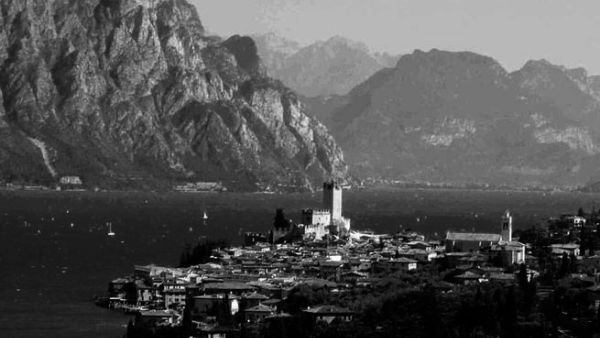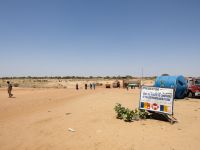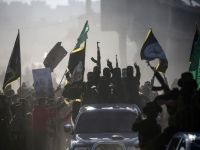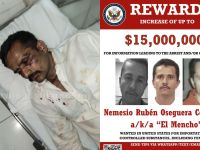By Eleanor Beevor
On 9th May, two alleged jihadist cells were caught in a joint operation by the Counter-Terrorism and Financial Crime divisions of the Italian police. Twenty homes were raided and 14 people were arrested - four on the island of Sardinia, and 10 in the northern town of Brescia.
The two groups are believed to be operating separately, though one individual had connections to both. Their crime is fundraising for the Al-Nusra Front, Al Qaeda's one time affiliate in Syria, and still a likely partner of the global jihadist network.
The transactions those arrested were making were shockingly high. Most were in the hundreds of thousands of euros, and one payment totaled over two million euros. The question is whether there was always a distant funding base for the terrorist group, or if this is a sign of new support far from home.
Al-Nusra Origins
Originally called Jabhat al-Nusra, the group was formed by a small group of jihadists from the Islamic State in Iraq (ISI) in 2011. Six ISI members, led by Abu Mohammed al-Jolani embedded themselves within Syrian jihadist networks, and soon had a basis for what would become one of the most dangerous non-state armed groups in the Syrian conflict - Jabhat al-Nusra, or the Al-Nusra Front.
When ISI renounced Al Qaeda and set itself up as an independent, would-be Islamic State, that which would go on to become ISIS, it tried to claim that Jabhat al-Nusra was a part of it. Jolani rebuffed the claim by pledging bayah (allegiance) to Al Qaeda leader Ayman al-Zawahiri. From here developed the acrimonious split between the Islamic State and its parent movement Al Qaeda.
Jabhat al-Nusra proved dangerously successful, not only on the battlefield, but also in leveraging political developments in Syria to their advantage. Whilst being an Al Qaeda affiliate was at first an obstacle to political support, Jabhat al-Nusra pushed a Syrian nationalist message.
They also joined military forces with the more mainstream opposition groups, which emerged against President Bashar Al Assad as the would-be revolution deteriorated into civil war. By moving in and out from under the umbrella of the Free Syrian Army, they were able to embed jihadist ideology, and an eventual commitment to Sharia governance in Syria, within broader opposition discourse.
Rebranding Al-Nusra

Al-Qaeda rebrands: Terrorist group rebounds under a new name – Hayat Tahrir al-Sham (AFP)
Thanks to their political strategizing, and to their success on the battlefield, they have proven a far more durable jihadist entity than ISIS, whose time seems to have come.
Jabhat al-Nusra has now officially rebranded itself as Hayat Tahrir al-Sham, the result of a merger with several smaller groups. Whilst it has also had some recent public divergences with Al Qaeda leadership, it is unlikely to ever truly divorce itself from its founding fathers.
However, one of the Al-Nusra group's persistent challenges has been funding, particularly after its bitter split from ISI. Prior to the split over 50% of its funding came from Iraq, and unlike the future ISIS, it was left unable to access the lucrative oilfields of Iraq. Since then, its income has been ad-hoc, although not unsubstantial.
Jabhat al-Nusra earned itself quite a reputation for kidnap and ransom. It kidnapped a number of foreigners working in Syria and the Golan Heights, from countries including Lebanon, America, Fiji, Italy and Qatar, as well as numerous Syrians. The group may have received up to $300 million in ransom payments between 2014 and 2016.
Lower budget
Fighters from al-Qaeda's main affiliate in Syria, al-Nusra Front, last April near Aleppo. AFP/Guillaume Briquet
In many ways, the Al-Nusra front has been able to operate on a lower budget than its rival ISIS by keeping its governance ambitions more modest.
It has endeavoured to provide some relief services to the civilians living under its control – such as subsidizing bread baking and water provision to citizens of Aleppo while the city was under its control in 2013. Sharia courts are provided, although given that Sharia law is an existential matter for Al Qaeda, that is no surprise. However, Al-Nusra takes as well as gives. Nicholas Heras, a Middle East Fellow at the Center for a New American Security told Al Bawaba:
“The group extracts significant financial resources from taxes and other fees that it places on people that live in the communities where it has power. It also has control over the routes from border crossings, which allows it to extract further rents.”
And despite its more limited governance infrastructure, and the diverse sources of funding it can draw on in-country, Al-Nusra still has a lot of expenses.
In 2016, the salary of a Nusra fighter was between $300 and $400 per month. With somewhere between five and 10,000 fighters at the time, the group required between $18 million and $48 million per year for salaries alone.
Given the unpredictability of the situation on the ground in Syria, Al-Nusra has been fortunate to have accumulated a number of foreign donors. But until recently, the vast majority of their known donors were in the Middle East, particularly in the Gulf states. The US Treasury’s list of known individuals financing Al Nusra had 10 individuals on it, seven of whom were from Kuwait.
The other three were a Qatari, Jordanian and a Turk. And even for those in nearby countries, getting the money to the group isn’t easy. Whether Al Nusra has banking access is unknown, although the evidence suggests any access is intermittent. At one point, Kuwaiti financiers were smuggling cash to them over the Turkish border.
Italian connection
But this Italian mass arrest suggests that the group’s international donors go much further beyond Syria’s borders than was previously thought.
Those arrested in Italy – most of whom were Syrian, though there were also two Moroccan nationals – are being charged with financing terrorists through the illegal distribution of money – more commonly known as money laundering. In the digital age, these sorts of transfers can be done in numerous ways. Nicholas Ryder, Professor of Financial Crime at the University of the West of England, told Al Bawaba:
“It is likely that they could rely on financial intermediaries, cash couriers or money mules, wire transfers or via non-remittance systems. It is also possible that terrorists could be exploiting social media platforms and the internet to launder the proceeds of crime.
Terrorists financiers have acted as cash couriers for terrorist groups and several have been detained at airports, arrested and subsequently convicted. Nonetheless, any person with access to the internet is able to act as an international terrorist financier, making it impossible to prevent all forms of funding.”
Money mules
But in the Islamic world, there is also an established process of transferring money without involving banks. It is known as a hawala system, and it is a network based on trust. If Person A wishes to send a hundred dollars to Person B, they would approach a hawala dealer.
The dealer then sends the money to another trusted hawala dealer living near Person B. Person B is given a password and visits the hawala dealer near them to collect the money. Meanwhile the hawala dealers must repay each other if they are to continue operating in the field, so the system depends on trust and reputation. And whilst hawala is used for many things, terrorists have found it to be an advantageous tool in their financial arsenal.
Nicholas Heras continued: “There is a hawala system of funding that comes from private donors outside of Syria, where money can be sent to associations linked with Jabhat al-Nusra. Law enforcement officials need to consider Europe as a chink in the armor in countering the transfer of finances to terrorist groups.
Europe is the gathering place where this money can be transferred, redirected, and sent on to other regions, especially Africa and the Gulf, where associations that work in the hawala system are active.
Jabhat al-Nusra's foreign funding relies on a network that is able move money around in the less obvious places, without a jihadist face, and this terrorist group is several steps ahead of law enforcement.”
How the arrested parties raised the money remains to be seen. But those influencing the conflict are clearly not always close to home.







